Introduction
Navigating the complexities of insulin resistance and its impact on weight gain can feel overwhelming. We understand that many individuals face this daunting journey. It’s essential to recognize how hormones, nutrition, exercise, and mental health intertwine in addressing this issue effectively.
In this article, we’ll explore ten practical strategies designed not only to combat weight gain associated with insulin resistance but also to promote overall metabolic health. Imagine harnessing these insights to achieve lasting results and enhance your quality of life. The answers lie in a tailored approach that empowers you to take control of your health.
You’re not alone in this journey. Together, we can uncover the steps that lead to a healthier, more fulfilling life.
CT Medical Weight Loss & Beyond: Personalized Solutions for Insulin Resistance and Weight Gain
At CT Medical Weight Loss & Beyond, we understand that navigating hormonal challenges and weight gain can be overwhelming. That’s why we utilize a comprehensive strategy designed to meet your unique wellness needs through tailored medical loss programs.
By conducting thorough evaluations, our clinic crafts personalized solutions that may include FDA-approved medications like Semaglutide and Tirzepatide, along with customized nutrition and exercise plans. This holistic approach not only addresses the specific hurdles posed by insulin resistance but also fosters lasting weight reduction while tackling weight gain insulin resistance and enhancing metabolic health.
Consider the inspiring journey of Ericka, whose transformation showcases the effectiveness of our personalized interventions, leading to significant fat loss and body fat reduction. Moreover, testimonials from our satisfied patients reflect the compassionate care and medical expertise that define CT Medical Weight Loss & Beyond. We believe that individualized support is key to achieving lasting results.
Healthcare professionals emphasize that personalized care is essential for success, allowing for adjustments based on each patient’s progress and specific needs. By prioritizing this individualized approach and offering extensive support, we ensure that you receive the vital assistance needed to navigate your weight loss journey successfully. Remember, you’re not alone in this journey; we’re here to support you every step of the way.
Semaglutide: A Key Treatment for Insulin Resistance and Weight Management
Semaglutide is an FDA-approved medication that mimics the hormone GLP-1, which plays a crucial role in regulating appetite and glucose metabolism. We understand that managing weight and metabolic health can be challenging, and clinical studies show that Semaglutide not only helps with significant weight loss but also improves glucose sensitivity. For example, participants in the SELECT trial experienced a remarkable reduction in diabetes progression, with only 3.5% of those treated with Semaglutide developing diabetes compared to 17.0% in the placebo group. This highlights Semaglutide’s effectiveness in managing body mass and enhancing overall metabolic health.
By promoting feelings of fullness and reducing food intake, Semaglutide becomes a vital tool in addressing weight gain and insulin resistance. Research indicates that the weight loss achieved through Semaglutide treatment is linked to better glycemic control, with an average HbA1c reduction of 1.6% observed in clinical trials. Moreover, real-world applications have shown that individuals using Semaglutide can experience significant reductions in body mass, with many reporting losses exceeding 50 pounds.
Take, for instance, a client at CT Medical Weight Loss & Beyond who felt frustrated despite her regular exercise and dietary efforts. She believed her hard work was in vain until she joined the program. After starting Semaglutide, she underwent a remarkable transformation, losing 18 lbs and reducing her body fat from 31.1% to 22.8%. Within just the first month, she noticed significant changes, including improved metabolism and better sleep. This success story exemplifies how personalized, physician-supervised programs can lead to sustainable health outcomes.
Experts emphasize the importance of GLP-1 in managing body mass, noting that utilizing BMI and waist-to-height ratio targets can lower the risk of obesity-related complications. Therefore, Semaglutide not only aids in managing body mass but also plays a vital role in preventing the negative effects associated with weight gain and insulin resistance. It establishes itself as a fundamental element in addressing obesity and related metabolic conditions. You’re not alone in this journey; with the right support and tools, a healthier future is within reach.
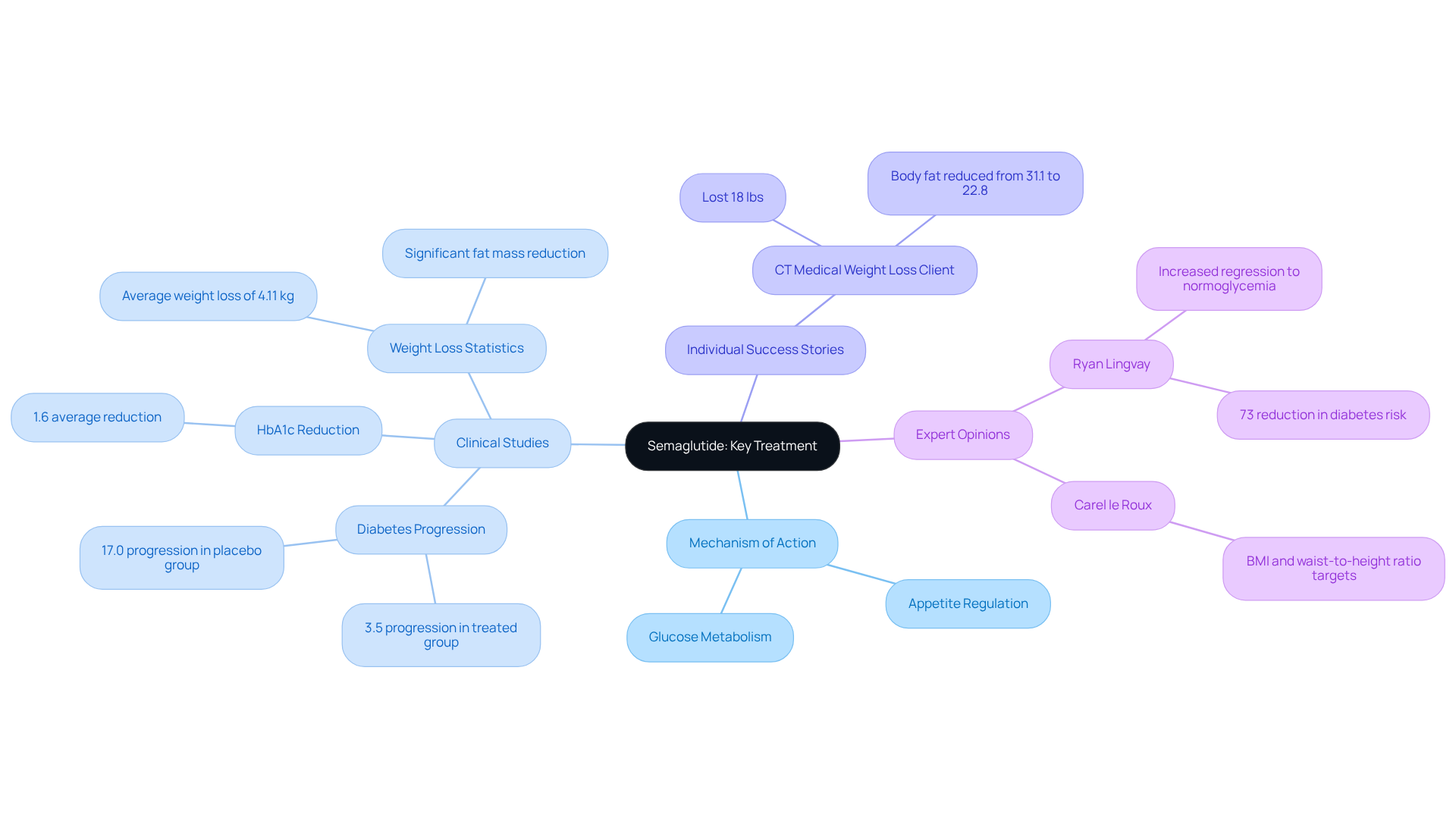
Dietary Choices: How Nutrition Affects Insulin Sensitivity and Weight Gain
Nutrition plays a crucial role in managing glucose sensitivity, and we understand that navigating this journey can be challenging. At CT Medical Nutrition & Beyond, we’re here to help you with tailored nutrition plans designed to promote healthy eating habits and balanced blood sugar levels. These elements are vital for successfully managing body mass.
Imagine a diet rich in whole foods – fruits, vegetables, whole grains, and lean proteins. Such choices can significantly improve your glucose sensitivity and help prevent weight gain and insulin resistance. On the flip side, diets loaded with processed foods, sugars, and unhealthy fats can make things tougher, worsening glucose resistance.
In addition, incorporating foods with a low glycemic index, like legumes and non-starchy vegetables, can stabilize your blood sugar levels and support your body composition goals. Furthermore, understanding the role of GLP-1, a hormone that aids in secretion and appetite regulation, is essential for your journey.
We’re committed to providing organized assistance through our 10 Point Touch System, ensuring you receive the guidance necessary to implement these dietary choices effectively. Together, we can promote sustainable weight loss and enhance your overall well-being. Remember, you’re not alone in this journey; we’re here to support you every step of the way.
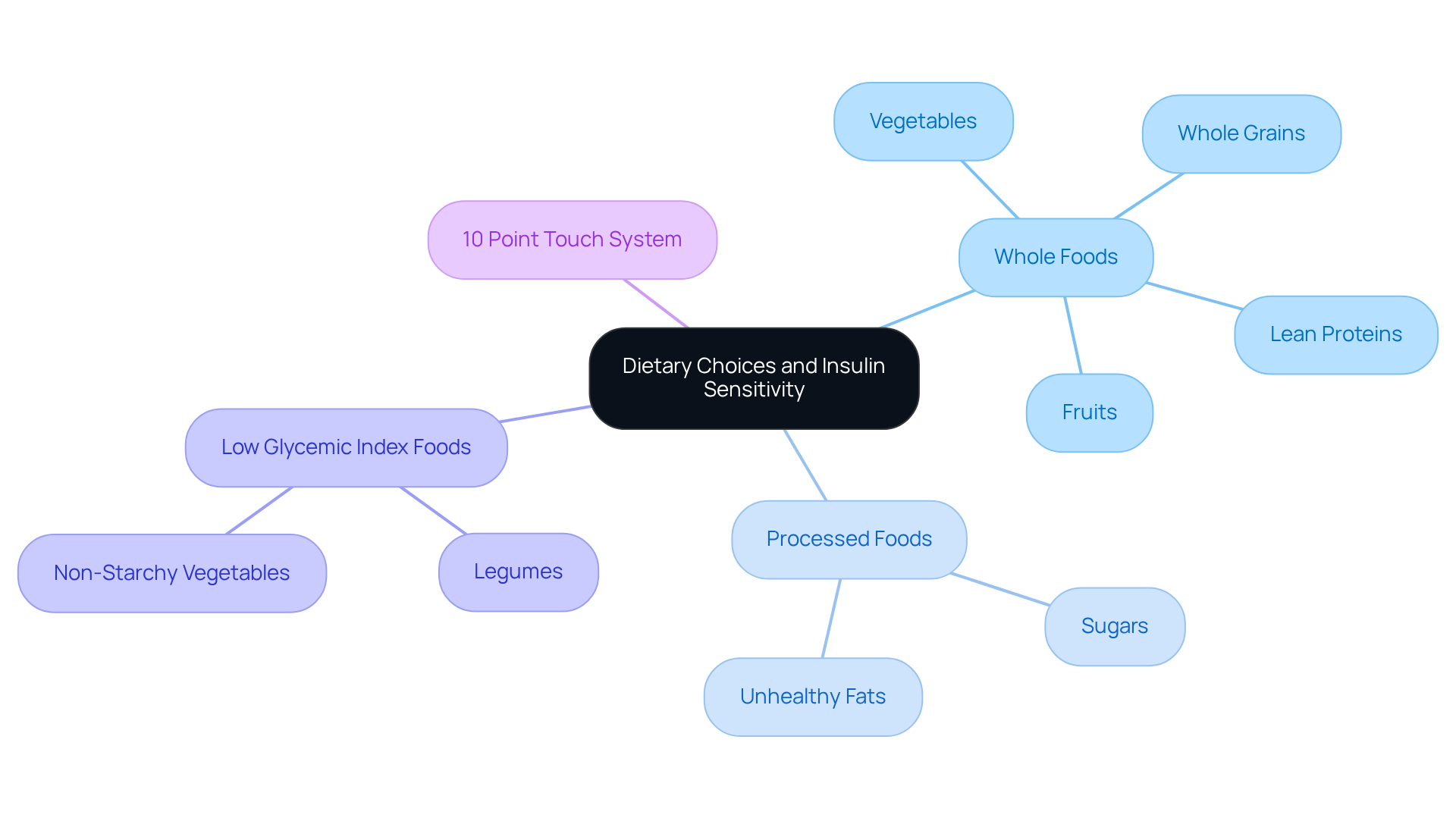
Exercise: Combatting Insulin Resistance to Prevent Weight Gain
We understand that consistent physical exercise can feel challenging, yet it’s vital for enhancing glucose sensitivity and preventing weight gain insulin resistance. At CT Medical Weight Loss & Beyond, we’re here to support you. Engaging in both aerobic exercises, like walking or cycling, and strength training can significantly boost your metabolic health.
Imagine having a customized app-based exercise program tailored to fit your schedule and availability. This way, you can maintain an active lifestyle without feeling overwhelmed. Aim for at least 150 minutes of moderate-intensity exercise each week. Not only does this help in reducing fat, but it also enhances your overall insulin function, thereby reducing the risk of weight gain insulin resistance.
In addition to exercise, we offer tailored medication modifications, including physician-recommended therapies like Semaglutide and Tirzepatide. These medications can help enhance feelings of fullness and assist in controlling appetite, making them essential components of a successful management plan.
You’re not alone in this journey. We’re here to guide and support you every step of the way.
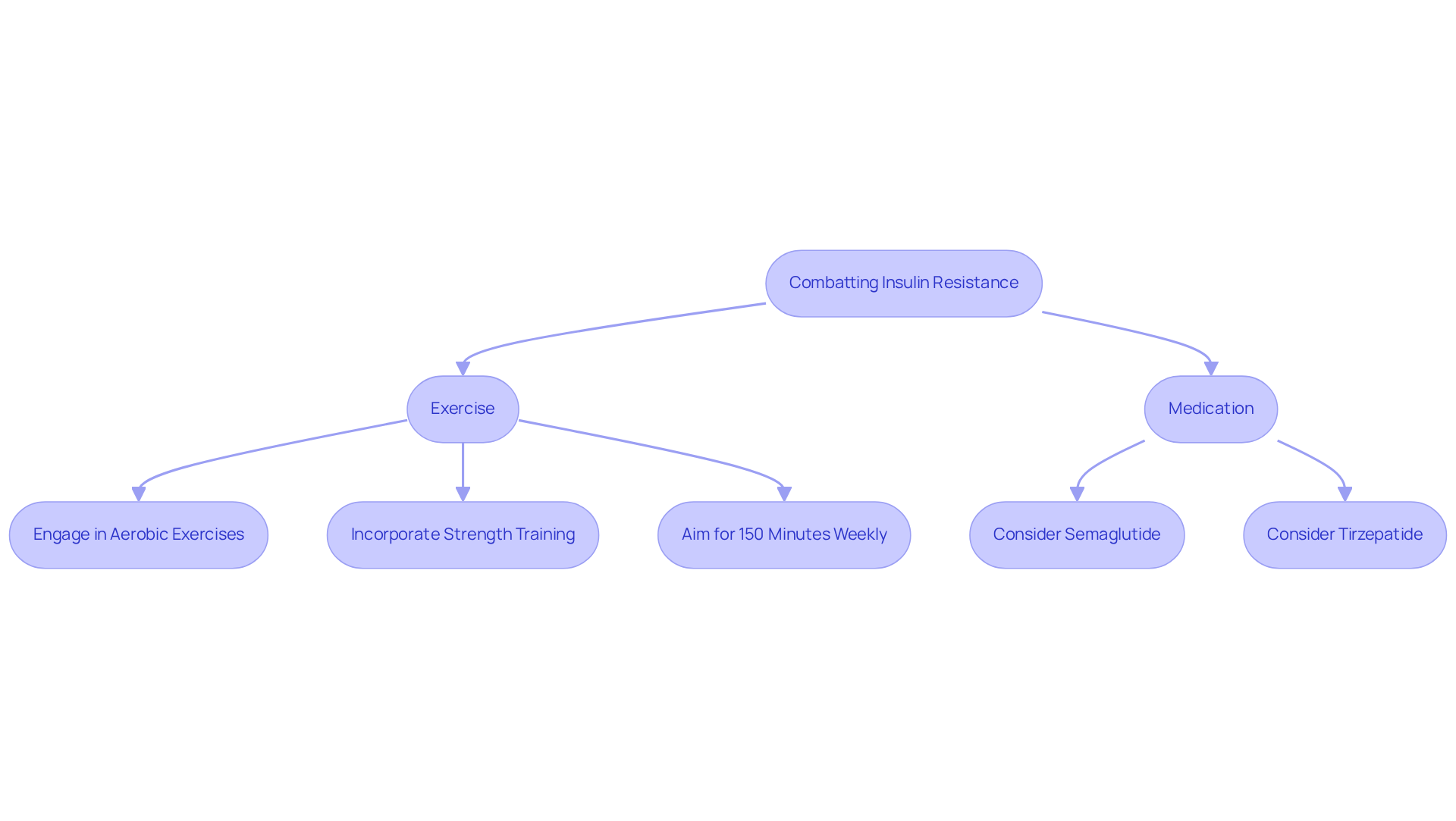
Mental Health: The Psychological Link Between Insulin Resistance and Weight Gain
Insulin intolerance affects more than just your physical health; it deeply impacts your psychological well-being too. We understand that stress, anxiety, and depression can lead to unhealthy eating habits and less physical activity, which only worsens weight gain insulin resistance. For instance, studies show that chronic stress raises cortisol levels, disrupting appetite regulation and promoting fat accumulation, especially around the abdomen. This creates a cycle where gaining weight can further exacerbate mental health issues.
To address these challenges, it’s essential to implement mental wellness strategies. Techniques like mindfulness meditation, cognitive behavioral therapy, and regular physical activity can significantly reduce stress and improve emotional regulation. Mindfulness practices, for example, enhance self-awareness and encourage healthier eating habits, helping you make more conscious food choices. Moreover, engaging in regular exercise not only supports weight management but also releases endorphins, which can help alleviate symptoms of anxiety and depression.
Experts emphasize the importance of addressing mental well-being alongside blood sugar management. Research indicates that individuals experiencing weight gain insulin resistance face a higher risk of mood disorders, with rates of depression and anxiety notably elevated in this group. Therefore, incorporating mental wellness support into weight loss programs can lead to more sustainable results. By prioritizing your mental health alongside physical health, you can break the cycle of stress and weight gain insulin resistance, paving the way for effective management and improved overall health. You’re not alone in this journey; support is available, and taking these steps can make a significant difference.
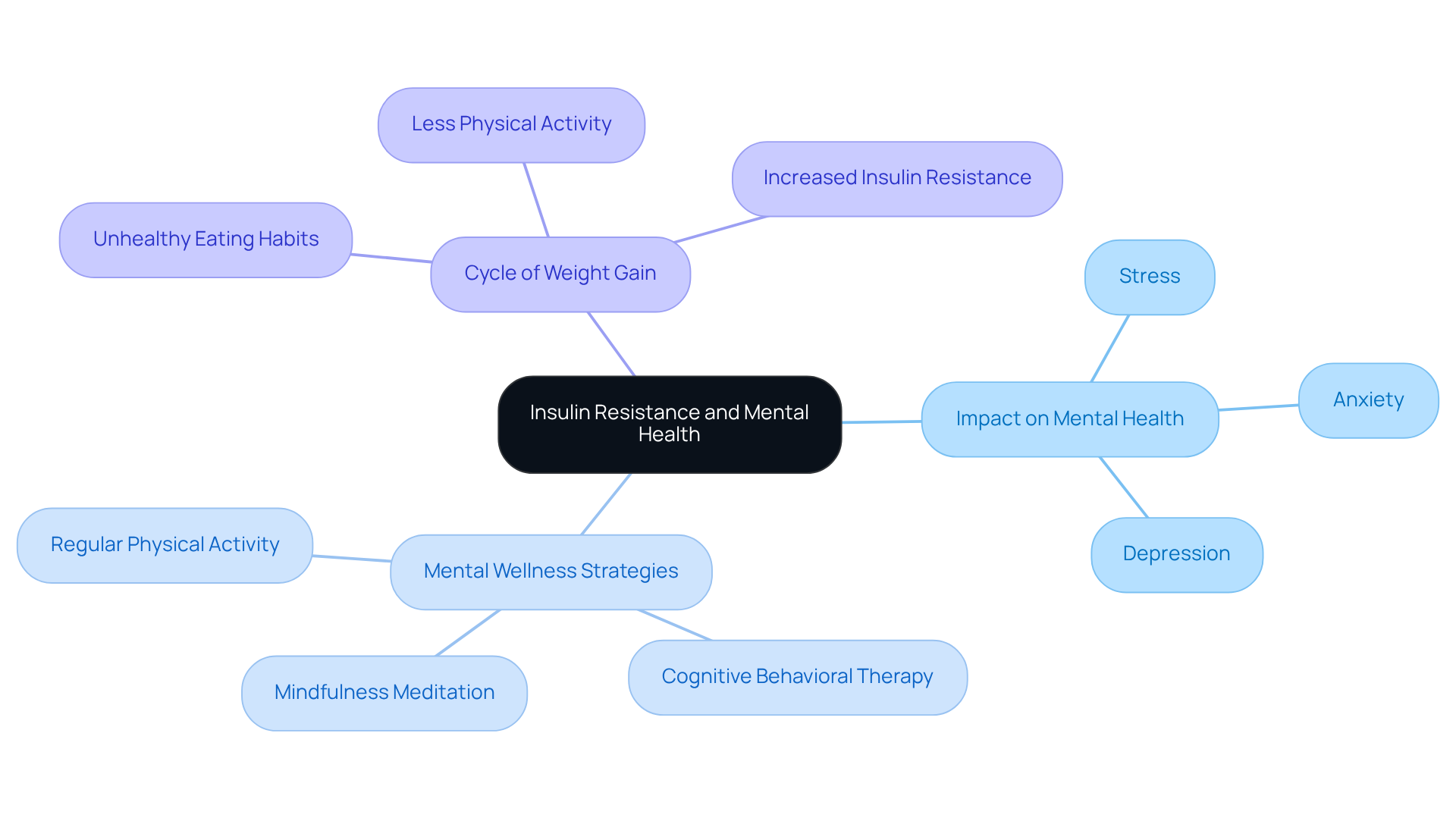
Sleep Quality: Its Role in Insulin Resistance and Weight Gain
Quality sleep is vital for maintaining your glucose sensitivity and keeping body mass in check. We understand that many struggle with getting enough rest, and studies show that insufficient sleep can contribute to:
- Weight gain
- Insulin resistance
- Higher cortisol levels, which can promote fat storage
Aiming for 7-9 hours of restorative sleep each night can significantly support your metabolic function and help manage body mass. Establishing a regular sleep schedule and creating a calming bedtime routine can make a world of difference in improving your sleep quality.
In addition, integrating a customized nutrition plan from CT Medical Loss & Beyond can enhance your sleep quality and metabolic health. This personalized assistance aligns with your weight loss objectives, ensuring you have the support you need on this journey. Remember, you’re not alone in this; we’re here to help you every step of the way.
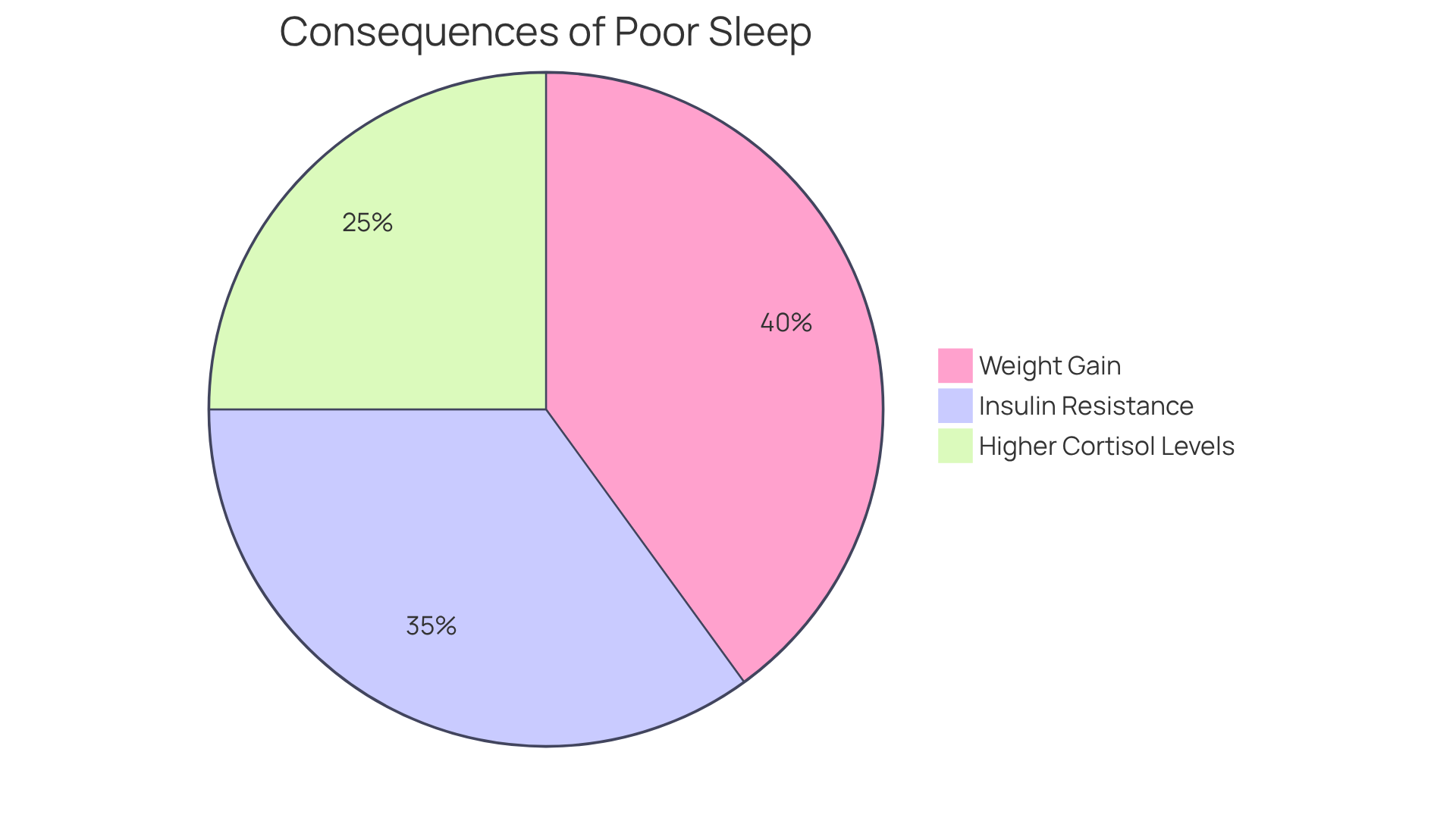
Stress Management: Reducing Insulin Resistance to Support Weight Loss
We understand that persistent stress can be overwhelming, often leading to increased cortisol levels that hinder glucose sensitivity and contribute to weight gain. Research shows that individuals facing high stress levels can experience a staggering 23% rise in visceral fat accumulation over just 18 months. This highlights how significantly stress can impact our body composition and overall health.
But there’s hope! Integrating stress management techniques, such as mindfulness and yoga, can make a real difference. Mindfulness-based interventions have shown remarkable results, improving glucose sensitivity and helping participants achieve greater fat loss while combating weight gain insulin resistance, leading to better metabolic outcomes compared to traditional methods.
Moreover, consistent physical activity is crucial in reducing stress and enhancing glucose sensitivity. Engaging in hobbies and spending quality time with loved ones can also provide essential emotional support, helping to alleviate stress and promote healthier lifestyle choices.
By adopting these strategies, you can effectively manage stress, enhance your glucose sensitivity, and support your fat loss efforts. Remember, you’re not alone in this journey, and with the right tools and support, you can achieve your health goals.
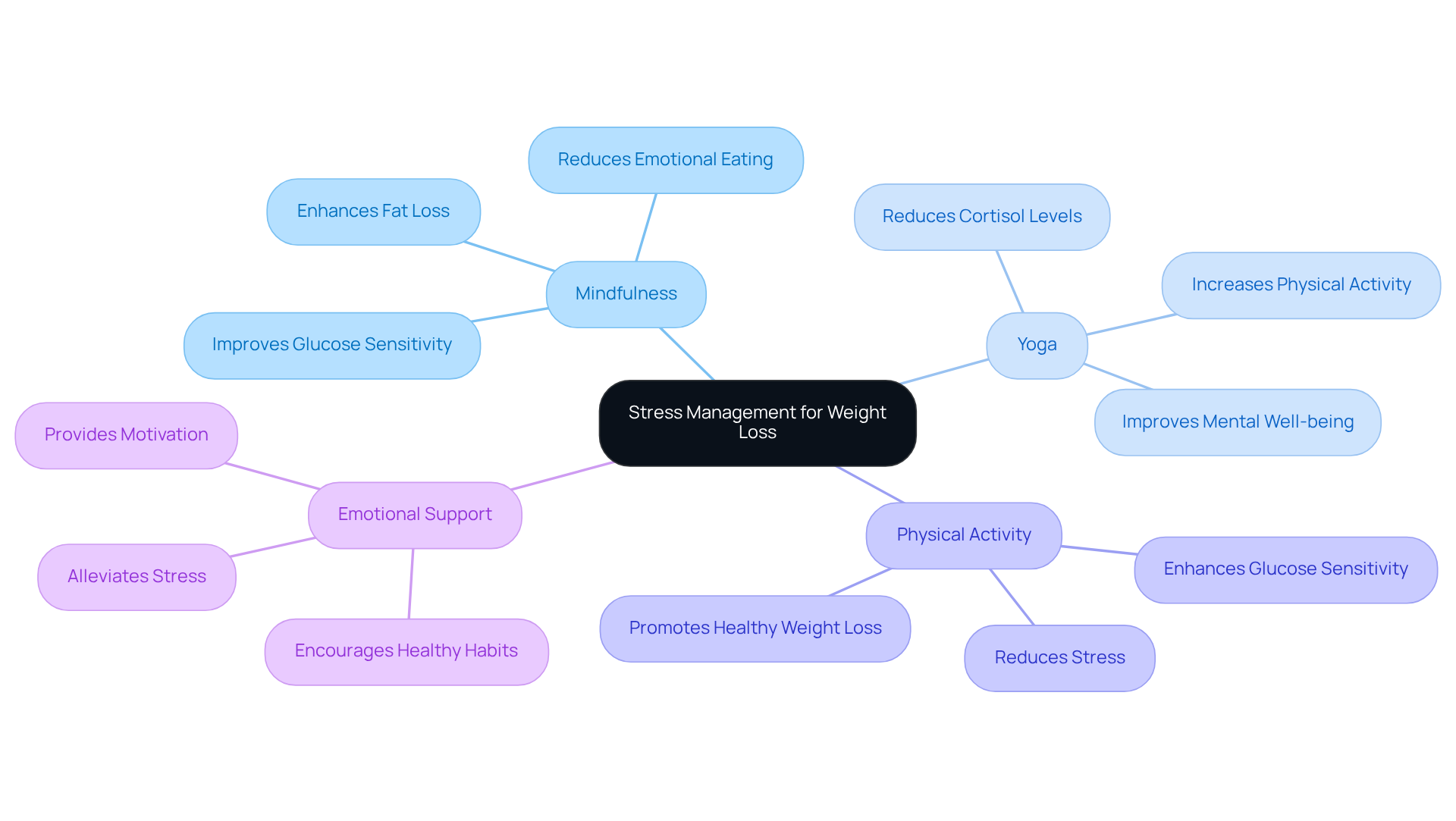
Hormonal Changes: Understanding Their Effect on Insulin Resistance and Weight Gain
Hormonal changes during menopause can be challenging, significantly impacting glucose sensitivity and often leading to increased body mass. As estrogen levels drop, many women find themselves facing heightened insulin resistance, which contributes to weight gain and makes it tougher to maintain a healthy weight. This connection is crucial; research shows that these hormonal shifts can lead to weight gain insulin resistance, causing greater fat storage, particularly around the abdomen, and a slower metabolism, which can make weight gain easier-even if dietary habits remain consistent.
We understand that navigating these changes can feel overwhelming, but there are proactive steps you can take to combat these effects. Regular physical activity is essential. Experts recommend aiming for at least 150 minutes of moderate-intensity exercise each week, incorporating both cardiovascular and strength-training activities. Finding enjoyable forms of exercise, like walking, yoga, or Pilates, can make it easier to stick to these routines. Dr. Monica Christmas emphasizes, “Experts suggest 150 minutes of moderate-intensity physical activity and two days of muscle strengthening each week,” highlighting the importance of structured exercise in managing body composition.
Real-world examples can inspire hope and illustrate the effectiveness of lifestyle adjustments. Take Ericka, for instance, a client at CT Medical Weight Loss & Beyond. With personalized support from the Custom Nutrition Program, she successfully lost 18 lbs and reduced her body fat percentage from 31% to 22.8%. This program offered her tailored advice, accountability, and strategies for incorporating whole foods, fiber, lean proteins, and healthy fats into her diet, enabling her to make sustainable changes. Women who remain active and mindful of their dietary choices often report minimal changes in their body mass during menopause.
Moreover, hormone replacement therapy (HRT) can also play a significant role in managing weight gain insulin resistance that is associated with menopause. Research indicates that women using HRT typically experience less weight gain compared to those who do not. A meta-analysis of 17 trials involving over 29,000 participants found that HRT significantly reduces insulin resistance, which is crucial for addressing weight gain insulin resistance and enhancing metabolic health during this transitional phase.
Understanding these hormonal shifts and their effects empowers you to take informed steps toward managing your body and overall health during menopause. Additionally, prioritizing sleep is vital; improving your sleep habits can help control body mass during this time. Remember, you’re not alone in this journey, and with the right support and strategies, you can navigate these changes with confidence.
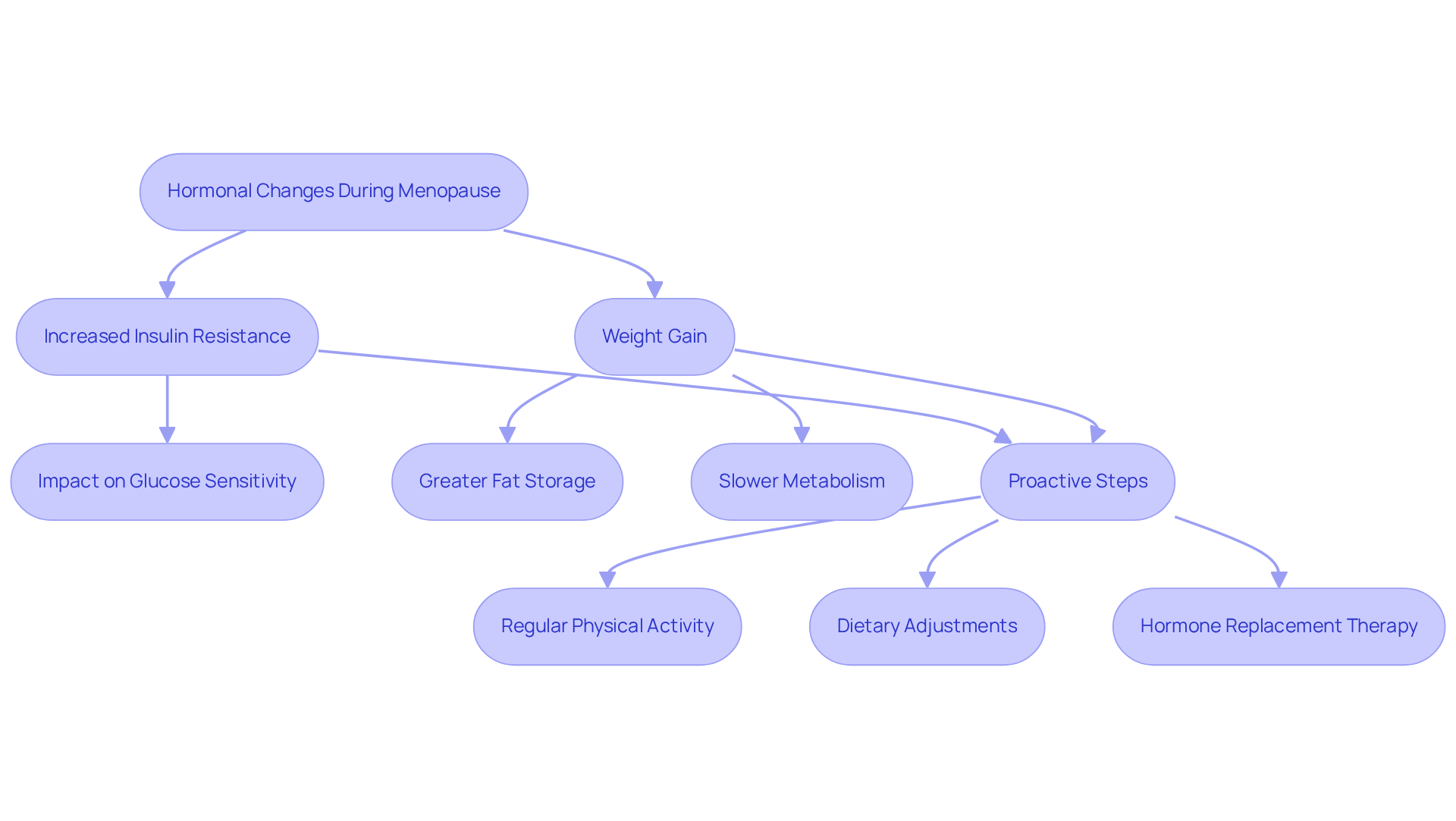
Supplements: Supporting Insulin Sensitivity and Weight Management
Dietary supplements can truly make a difference in improving glucose sensitivity and addressing weight gain insulin resistance. We understand that navigating these challenges can be tough, but options like chromium and berberine have shown promising results.
Chromium, a trace mineral, has been found to enhance glucose regulation, which may lead to a decrease in body mass. A systematic review revealed that chromium supplementation resulted in a mean reduction of HbA1c by about 0.54%. This is comparable to some oral hypoglycemic medications, although we should note that the certainty of this evidence is still low.
In addition, berberine, a compound derived from various plants, has demonstrated strong anti-obesity effects. It works through several mechanisms, including boosting insulin sensitivity and modulating lipid metabolism, which are important to prevent weight gain insulin resistance. Clinical studies have shown significant reductions in body mass and improvements in metabolic parameters among those taking berberine. For instance, one important study found that individuals taking 500 mg of berberine three times a day lost an average of about 2.3 kg over 12 weeks, along with notable reductions in triglycerides and total cholesterol levels.
Moreover, omega-3 fatty acids can also support weight control by reducing inflammation and enhancing glucose sensitivity. Research suggests that omega-3 supplementation can increase the production of anti-inflammatory adipokines, further promoting metabolic health. A recent study highlighted that participants receiving omega-3 fatty acids showed significant improvements in lipid profiles and metabolic sensitivity compared to those on a placebo.
Experts agree on the potential of these supplements in managing body weight and combating weight gain insulin resistance. However, it’s essential to approach supplementation with care. Consulting a healthcare provider before starting any supplement regimen is crucial to ensure safety and effectiveness, especially when combined with a balanced diet and exercise plan. Remember, you’re not alone in this journey; a comprehensive approach can amplify the benefits of these supplements in addressing body weight concerns related to weight gain insulin resistance.
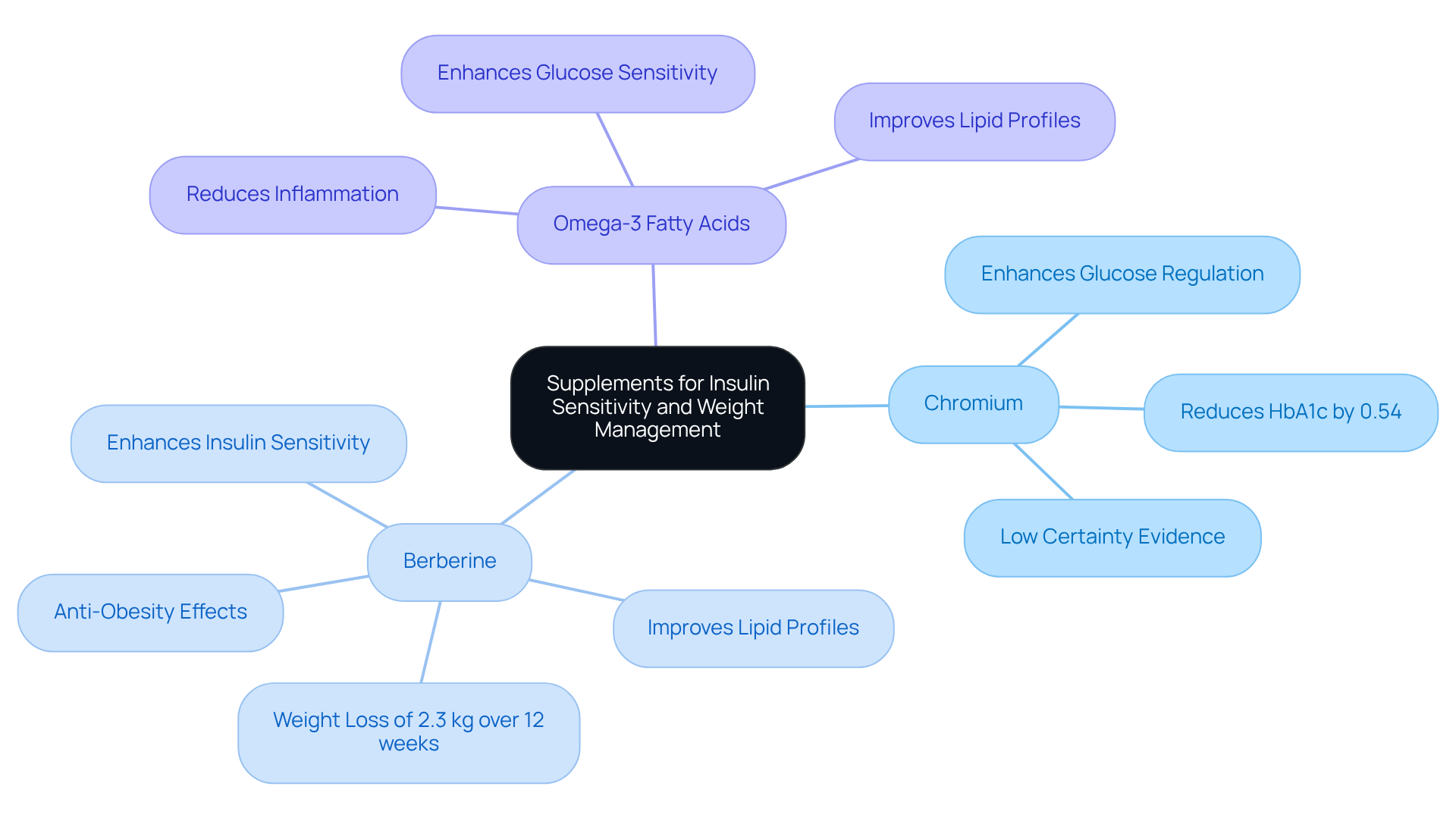
Holistic Approach: Integrating Multiple Factors to Combat Insulin Resistance and Weight Gain
Addressing metabolic challenges and gaining mass can feel overwhelming, but you’re not alone in this journey. A comprehensive strategy that combines various lifestyle elements – like nutrition, physical activity, rest, stress control, and hormonal balance – can make a significant difference. Studies show that individuals who embrace extensive lifestyle modifications often see remarkable improvements in their glucose sensitivity and overall well-being. In fact, research indicates that nearly 40% of those who adopt comprehensive lifestyle changes achieve at least a 10% decrease in weight, which is crucial for effectively managing weight gain insulin resistance.
Incorporating a balanced diet rich in whole foods, such as fruits, vegetables, and lean proteins, is essential. Registered dietitians emphasize that following dietary guidelines – like aiming for five servings of fruits and vegetables daily – can greatly enhance metabolic health. Furthermore, consistent physical activity, with a minimum of 150 minutes each week, has been linked to improved glucose sensitivity and reduced inflammation levels.
Sleep quality and stress management also play pivotal roles in your metabolic health. Persistent stress can negatively impact blood sugar regulation, while adequate rest fosters hormonal balance and recovery. By addressing these interconnected factors, you can create a sustainable management plan that not only targets weight loss but also nurtures your overall well-being.
Collaborating with healthcare professionals, such as registered dietitians and medical providers, can further enhance the effectiveness of this comprehensive strategy. Their expertise can guide you in making informed choices that align with your health goals, ultimately leading to better outcomes in managing insulin resistance and addressing weight gain insulin resistance for achieving lasting weight loss. Remember, you’re taking important steps towards a healthier you, and support is always available.
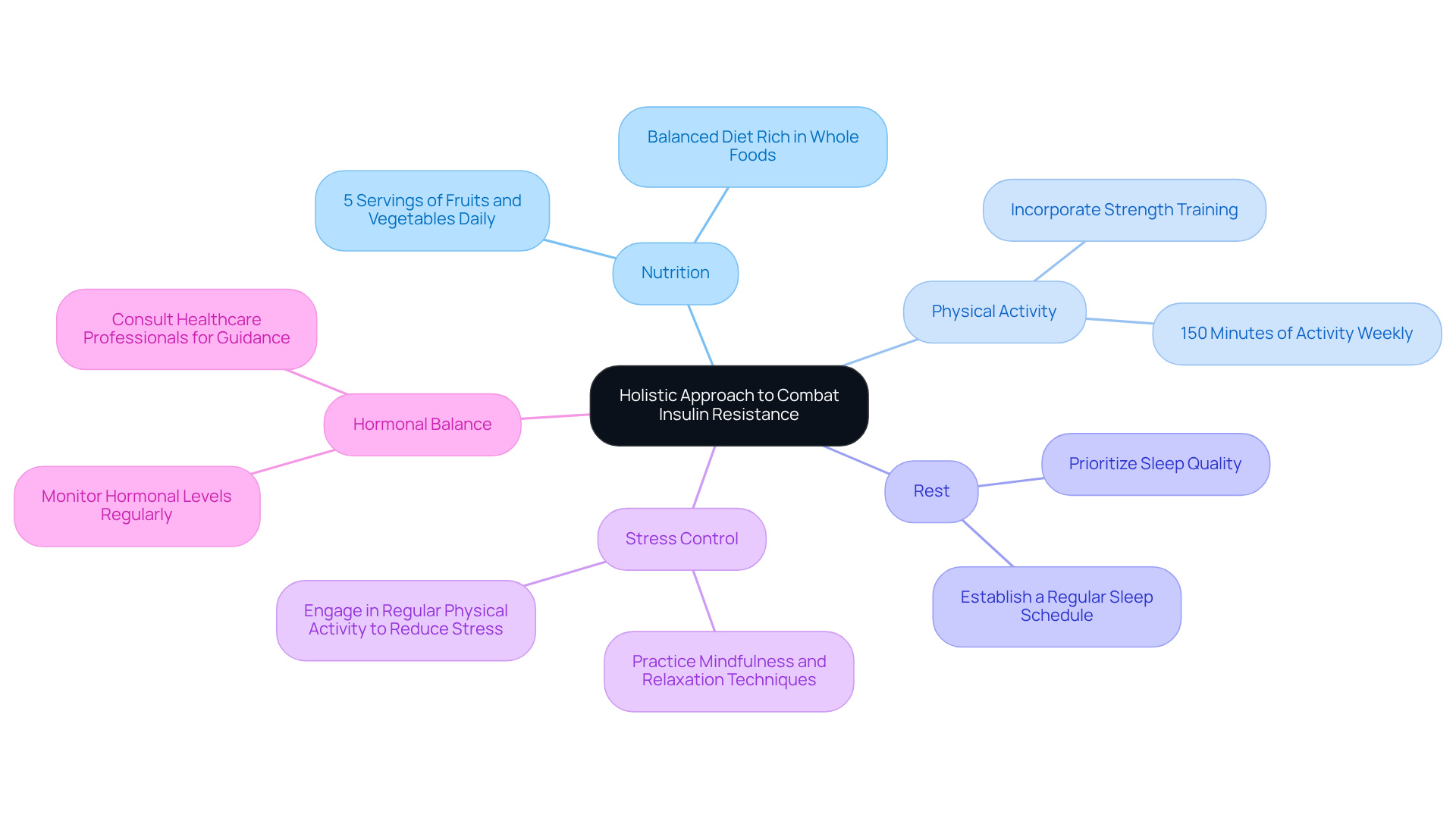
Conclusion
Addressing weight gain stemming from insulin resistance can feel overwhelming, but you’re not alone in this journey. It requires a multifaceted approach that combines personalized medical interventions, nutritional strategies, physical activity, and mental wellness. The insights shared throughout this article highlight the importance of tailored solutions, such as FDA-approved medications like Semaglutide, which have shown significant effectiveness in managing weight and enhancing metabolic health.
In addition, understanding the role of nutrition, exercise, and psychological well-being is crucial in creating a sustainable path toward improved health outcomes. Key strategies to consider include:
- Implementing balanced diets rich in whole foods
- Engaging in regular physical exercise
- Practicing effective stress management techniques
Each of these components plays a vital role in enhancing insulin sensitivity and preventing weight gain. Furthermore, recognizing the influence of hormonal changes and the potential benefits of supplements can empower you to take control of your health journey.
Ultimately, fostering a holistic approach that integrates these various factors can lead to lasting improvements in both physical and mental health. It’s essential to seek support from healthcare professionals who can provide guidance and accountability, ensuring that you receive the personalized care needed to navigate the complexities of insulin resistance. By taking proactive steps and embracing comprehensive strategies, a healthier, more balanced life is within reach.
Frequently Asked Questions
What is CT Medical Weight Loss & Beyond?
CT Medical Weight Loss & Beyond is a clinic that provides personalized medical weight loss programs designed to address hormonal challenges and weight gain, particularly focusing on insulin resistance.
How does CT Medical Weight Loss & Beyond create personalized solutions?
The clinic conducts thorough evaluations to craft tailored solutions that may include FDA-approved medications like Semaglutide and Tirzepatide, along with customized nutrition and exercise plans.
What role does Semaglutide play in weight management?
Semaglutide is an FDA-approved medication that mimics the hormone GLP-1, helping to regulate appetite and glucose metabolism, leading to significant weight loss and improved glucose sensitivity.
What are the benefits of using Semaglutide based on clinical studies?
Clinical studies, such as the SELECT trial, show that Semaglutide can lead to significant weight loss and reduce the progression of diabetes, with only 3.5% of participants developing diabetes compared to 17.0% in the placebo group.
How does nutrition affect insulin sensitivity and weight gain?
Nutrition plays a crucial role in managing glucose sensitivity. A diet rich in whole foods can improve glucose sensitivity, while diets high in processed foods and sugars can worsen insulin resistance.
What dietary choices are recommended for managing body mass?
Recommended dietary choices include consuming whole foods such as fruits, vegetables, whole grains, and lean proteins, as well as incorporating low glycemic index foods like legumes and non-starchy vegetables.
What support does CT Medical Weight Loss & Beyond offer?
The clinic offers extensive support through their 10 Point Touch System, providing organized assistance to help individuals implement healthy dietary choices and promote sustainable weight loss.
Can personal experiences highlight the effectiveness of the program?
Yes, testimonials from patients, such as the success story of a client who lost 18 lbs and reduced body fat significantly after starting Semaglutide, illustrate the effectiveness of the personalized interventions provided by the clinic.
Why is individualized care important in weight loss programs?
Individualized care is essential for success because it allows for adjustments based on each patient’s progress and specific needs, ensuring they receive the necessary support throughout their weight loss journey.




